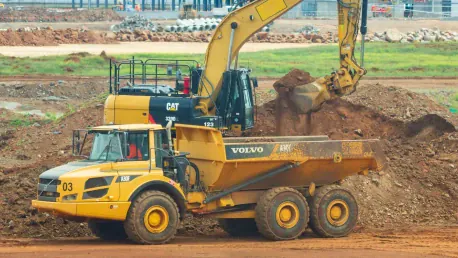The construction industry is on the brink of significant transformation as it heads into 2025. With the advent of advanced technology, an unwavering commitment to sustainability, and the necessity to adapt to economic and geopolitical shifts, the industry is poised for dynamic changes. Insights from industry leaders like Scott Young of Volvo Construction Equipment (CE) offer a comprehensive overview of the trends, challenges, and opportunities that lie ahead. As the industry evolves, companies are strategically positioning themselves to navigate these changes and capitalize on the growth opportunities that come with them.
Economic Recovery and Market Adjustments
The construction industry has been navigating a complex landscape marked by economic recovery and market adjustments. In 2024, the industry experienced mixed growth as it continued to recover from the lingering effects of inflation, high interest rates, and global conflicts. Despite these challenges, the North American market remained relatively strong, providing a stable foundation for companies like Volvo CE to effectively navigate these turbulent times. The industry’s resilience in the face of economic uncertainties has been commendable, allowing it to make strategic investments and expand its product and service offerings.
As the construction industry moves into 2025, economic resilience will be crucial for sustained success. Companies are focusing on strategic investments in new technologies and expanding their product and service portfolios to capitalize on growth opportunities. The ability to adapt to changing market conditions and geopolitical impacts will be essential in ensuring continued success in a rapidly evolving landscape. By maintaining a focus on economic recovery and market adjustments, the industry can position itself for long-term growth and stability.
Product and Service Expansion
Volvo Construction Equipment has been at the forefront of product and service expansion, launching over 30% new products and services. This notable expansion includes a significant push towards electric machines, highlighting the company’s commitment to sustainable solutions. The introduction of these new technologies aims to support customers across all major segments of the construction industry, from residential and commercial projects to large-scale infrastructure initiatives.
The focus on electric machines and other sustainable solutions is a testament to the industry’s dedication to reducing its environmental footprint. By investing in innovative products and services, companies are not only meeting the evolving needs of their customers but also contributing to a more sustainable future. This proactive approach ensures that the industry remains competitive and aligns with global sustainability goals, setting a precedent for future growth and development.
Importance of Flexibility and Agility
Flexibility and agility have become critical attributes for companies in the construction industry. The ability to respond quickly to shifting market demands and geopolitical impacts is essential for success. This responsiveness includes leveraging data and technology to develop and enhance sustainability systems, allowing companies to optimize their operations and drive innovation.
Embracing flexibility and agility enables companies to better respond to customer needs, optimize operations, and maintain a competitive edge in the industry. By being adaptable, companies can navigate the rapidly changing landscape effectively, ensuring they remain at the forefront of industry advancements. This approach is key to thriving in an environment marked by constant change and evolving customer expectations.
Megaprojects and Sustainability Goals
Megaprojects, such as data centers and energy infrastructure developments, present significant opportunities for the construction industry. These large-scale projects are often driven by major players with sustainability goals that align closely with those of companies like Volvo CE. This alignment paves the way for strong partnerships, enabling the successful execution of ambitious and sustainable projects.
Volvo Group’s diverse range of transport and construction solutions, coupled with a focus on technology, positions it as a valuable partner for these initiatives. By collaborating with major project players, companies can contribute to the development of large-scale, sustainable infrastructure that meets the needs of modern society. This synergy between companies and megaprojects not only drives growth but also underscores the industry’s commitment to sustainability.
Challenges in Sustainable Power and Data Utilization
The ongoing transformation to sustainable power systems and the need to leverage data to enhance customer value are identified as major challenges for the construction industry. Despite the competitive and ever-evolving North American market, companies like Volvo CE remain confident in their ability to contribute significantly to these areas. Addressing these challenges requires a strategic approach that includes investments in technology and data analytics.
By harnessing the power of data, companies can improve efficiency, optimize performance, and deliver greater value to their customers. This data-driven approach allows companies to make informed decisions, streamline operations, and ultimately enhance the overall customer experience. As the industry continues to evolve, the effective utilization of data will be key to overcoming challenges and driving future success.
Dealer Support and Investment
Dealers play a crucial role in the construction industry, but they face challenges in finding capital for inventory and investment while adapting to post-pandemic market conditions and future solutions. Volvo CE aims to support dealers through improved forecasting and programs that meet customer needs. The goal is to simplify the customer experience, whether they have one machine or hundreds.
By providing the necessary support and resources, companies can help dealers navigate the evolving market landscape and ensure they are well-equipped to meet customer demands. This collaborative approach strengthens the relationship between manufacturers and dealers, fostering a more resilient and adaptable industry. Enhancing dealer support and investing in their success will be essential in ensuring the industry’s continued growth and stability.
Technology and AI Implementation
Artificial intelligence (AI) is seen as a tool with substantial potential to improve efficiency in the construction industry. AI can be used for data evaluation, scenario building, forecasting needs, and performance analysis. By automating these tasks, employees can focus on creating value and connecting with customers. The implementation of AI and other advanced technologies will be crucial for enhancing operational efficiency and driving innovation.
Companies that embrace AI and other cutting-edge technologies will be better positioned to meet the evolving needs of their customers and stay ahead of the competition. By leveraging AI, companies can streamline processes, reduce costs, and improve overall productivity. This forward-thinking approach ensures that the industry remains at the forefront of technological advancements, driving future growth and success.
Alternative Power Sources
The demand for electric, hydrogen, and other alternatively fueled equipment varies across the construction industry. As the industry is still in the education phase regarding these technologies, incentives and regulations in different regions play a significant role in driving demand. Volvo CE believes in a mixed approach to sustainable power, integrating various sources to meet different customer needs and applications.
By offering a range of alternative power solutions, companies can cater to diverse customer requirements and contribute to a more sustainable future. The adoption of alternative power sources not only reduces the industry’s environmental impact but also positions it as a leader in sustainable practices. Embracing a mixed approach to power ensures that companies can meet the unique needs of their customers while promoting a greener future.
Impact of Political Changes
As a global company, Volvo CE is accustomed to changes in administrations and does not expect a significant shift in focus. The company remains dedicated to being a great employer, a reliable partner to customers and dealers, and helping communities build the world they envision. Political changes can have an impact on the industry, but companies that remain focused on their core values and objectives will be better equipped to navigate these changes.
By maintaining a commitment to sustainability, innovation, and customer satisfaction, companies can weather political shifts and continue to drive growth and success. The construction industry, with its focus on adaptability and resilience, is well-positioned to thrive in an ever-changing political landscape, ensuring its continued progress and development.
Conclusion
The construction industry is on the verge of a substantial transformation as it approaches 2025. With the rise of advanced technology, a steadfast commitment to sustainability, and the need to adapt to ongoing economic and geopolitical changes, the industry is set for dynamic shifts. Industry leaders, like Scott Young of Volvo Construction Equipment (CE), provide valuable insights into the emerging trends, challenges, and opportunities that the industry will face. As technological innovations continue to evolve, companies are increasingly adopting new tools and methodologies that promise greater efficiency and reduced environmental impact.
Furthermore, sustainability is becoming more than just a buzzword; it is integral to modern construction practices. Companies are embracing eco-friendly materials, green building standards, and renewable energy sources to meet the growing demand for sustainable solutions.
Adapting to economic fluctuations and geopolitical developments also plays a significant role. These factors compel the construction industry to remain agile and responsive to changing market conditions and regulatory environments. As companies navigate this evolving landscape, they strategically position themselves to seize growth opportunities and drive progress. The convergence of technology, sustainability, and adaptability will redefine the construction industry, ensuring its resilience and success in the years to come.









